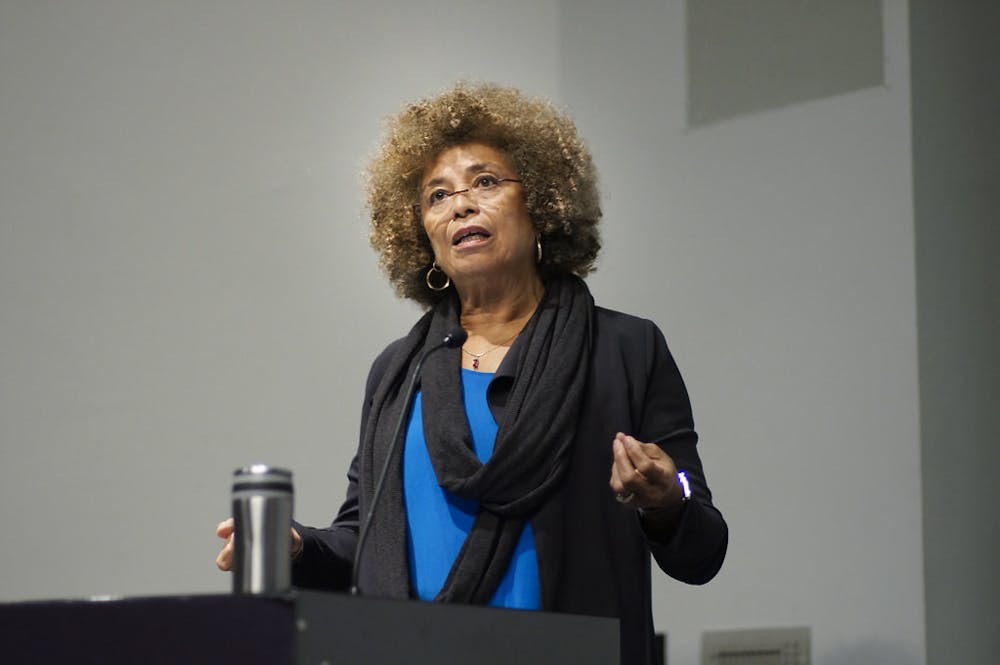The Foreign Affairs Symposium (FAS) hosted activist, academic and author Angela Davis to discuss racism and policing on April 22.
The final event of the symposium’s “Where Do We Go From Here?” speaker series was hosted by FAS Co-Directors Ryan Ebrahimy and Margaret Hanson and moderated by Stuart Schrader, associate director of the Program in Racism, Immigration and Citizenship and lecturer in the Department of Sociology.
Davis, a professor at the University of California, Santa Cruz was a leading figure in the Black power and feminist movements and two-time vice presidential candidate for the Communist Party USA. She was inducted into the National Women’s Hall of Fame and was named the 1971 Time Woman of the Year.
Davis’ talk centered around combatting racism and oppression. She explained how the prison system is inherently discriminatory.
“The prison system [is] perhaps the most dramatic example of structural racism,“ she said. “It's linked to the history of Black people and the struggles for justice and equality.”
Davis noted that the subjugation of other racial and ethnic minorities has also contributed to the development of racist institutions.
“It's important to move away from an analysis of racism that remains wedded to Black-white framework and point out that the incarceration of Japanese Americans during World War II has played a role in the emergence of the prison-industrial complex,” she said.
During the pandemic, there has been a significant increase in anti-Asian hate crimes and incidents in the form of slurs, shunning and physical attacks. These attacks have noticeably targeted women and elders.
Davis believes it is critical for Black communities to stand in solidarity with Asian communities in the wake of the uptick in anti-Asian violence.
“The two communities have never been separate communities. There have always been interaction and interchanges,” she said. “If we are serious about dismantling structural racism, then we definitely have to combat this explosion in anti-Asian racism.”
Junior Elly Ren enjoyed that Davis discussed multiple dimensions of racism.
“I really appreciate her as someone who tackles multiple oppressions and uplifts... those most at the margins of society,” Ren said. “Everything she said was something insightful and something new.”
Since George Floyd was murdered by a Minneapolis police officer last summer, calls to defund or abolish police forces have been at the center of national dialogue. Davis emphasized that society needs to embrace other methods of promoting safety and security rather than relying on the police.
“I say a different approach because I'm not saying that we don't deserve to be safe and secure,” she said. “The police are not accomplishing that goal, and we have to figure out other ways, other institutions that can more effectively help to create safety and security in our communities.”
She proposed alternatives to funding private police forces.
“We need new kinds of institutions in our communities. We need more education, we need more housing, we need more jobs. We need to be attentive to the overall socioeconomic conditions,” she said. “What if some of that money, not all [but] some of it, was used for scholarships and fellowships?”
Ebrahimy was grateful that the group could host Davis this year since her talk was postponed last year due to the pandemic. He found the conversation surrounding policing to be enlightening.
“Davis’ responses to issues affecting the Hopkins and Baltimore communities were especially appreciated, particularly those encouraging ongoing efforts by students and faculty to oppose the school’s private police force plans,” he said.
As a lifelong vocal activist, she reflected on the importance of internationalism and hope.
“We cannot imagine ourselves in isolation of the struggles of people in other parts of the world,” she said. “It has become apparent to me [that] the work of activism is to generate hope among those who are actively involved, as well as those who are onlookers.”
Ebrahimy was inspired by Davis’ optimistic outlook.
“In a time of such chaos and dysfunction in our politics, hearing her also remind us that ‘hope is a discipline’ is something that will stick with me for a long while,” he said.





